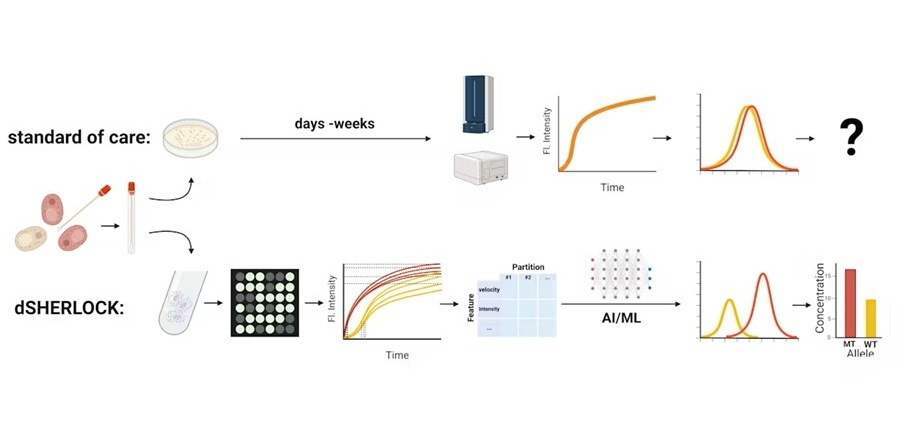Innovative Diagnostic Approach for Bacterial Infections to Enable Faster and Effective Treatment
Posted on 21 Oct 2024
For patients with bacterial infections, timely treatment with the appropriate antibiotics significantly improves their chances of recovery. Current methods for identifying which antibiotics will be effective for each patient involve culturing bacteria from the patient in a laboratory, a process that takes several days to provide results. During this time, patients are often prescribed broad-spectrum antibiotics, which can create drug-resistant infections—a major public health concern. Now, an innovative diagnostic approach could potentially enable patients with bacterial infections to receive the most effective treatment more quickly, thereby reducing the reliance on broad-spectrum antibacterials.
The method, named Genotypic and Phenotypic Antibiotic Susceptibility Testing through RNA detection, or GoPhAST-R, has been developed by researchers at the Broad Institute of MIT and Harvard, in collaboration with Massachusetts General Hospital (Cambridge, MA, USA). This technique analyzes both the growth and genetic activity of bacteria to quickly assess the pathogen's susceptibility to various antibiotics. In the GoPhAST-R approach, bacterial samples are exposed to a range of antibiotics, after which an RNA detection platform is used to identify distinct patterns of change in messenger RNA expression, which indicate differences in bacterial gene activity. These mRNA changes occur within minutes of antibiotic exposure in drug-susceptible bacteria, while they do not appear in drug-resistant strains. Additionally, the method investigates genes associated with antibiotic resistance, providing insights into the underlying bacterial mechanisms and suggesting potential therapeutic options. The researchers have also demonstrated the approach's effectiveness in a pilot study involving blood cultures from patients receiving inpatient treatment for infections.
_1.jpg)
In their previous work with a limited number of patient samples, the research team demonstrated that GoPhAST-R could ascertain antibiotic susceptibility in under four hours after bacteria were detected in a blood culture, compared to 28-40 hours using conventional clinical laboratory techniques. In the new study, they expanded the clinical pilot to encompass blood samples from 42 patients hospitalized with infections caused by Escherichia coli or Klebsiella pneumoniae, which are among the most common pathogens responsible for bloodstream infections. The researchers exposed the blood cultures to nine different antibiotics from three distinct classes and subsequently conducted transcriptional profiling on the NanoString platform. They analyzed mRNA changes in 10 genes for each antibiotic class, along with a select few genes that confer resistance to beta-lactam antibiotics. According to a paper published on the pre-print server medRxiv and findings reported in the Journal of Clinical Microbiology, their results demonstrated 95% agreement with those obtained from gold-standard growth-based assays for antibiotic susceptibility.
"In this pilot, we've shown that GoPhAST-R is an approach that can work well in the clinic," said study senior author Roby Bhattacharyya, an associate member at the Broad Institute of MIT and Harvard. "The next step will be to show GoPhAST-R's utility in making decisions about patient care in real time. We'd love to one day see it as an assay that can be employed in hospitals everywhere, to help patients get more effective treatments without promoting drug resistance."
Related Links:
Broad Institute of MIT and Harvard













